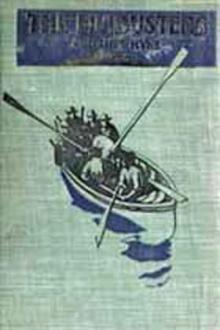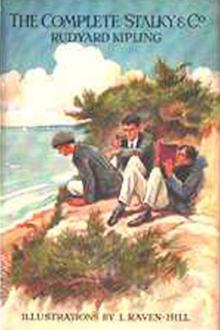Genre Adventure. Page - 12

is Photo-Telephone." With that a person talking could not only see the features of the person with whom he was conversing, but, by means of a selenium plate and a sort of camera, a permanent picture could be taken of the person at either end of the wire.
By means of this invention Tom had been able to make a picture that had saved a fortune. But Tom did not stop there. With him to invent was as natural and necessary as breathing. He simply could not stop it. And so we find him now about to show to his chum, Ned Newton, his latest patent, an aerial warship, which, however, was not the success Tom had hoped for.
But just at present other matters than the warship were in Tom's mind. The red shed was on fire.
That mere statement might not mean anything special to the ordinary person, but to Tom, his father, and those who knew about his shops, it meant much.
"The red shed!" Tom cried. "We mustn't let that get the best of us! Everybody at work! Father, not you, though. You mustn't excite

ere at present living.
Besides carrying out the wishes of his patroness, Ben intended to try his hand at mining, and had employed the interval of three weeks since he discovered Mr. Dewey in working the latter's claim, with the success already referred to.
The time when the two friends are introduced to the reader is at the close of the day, when, fatigued by their work on the claim, they are glad to rest and chat. Mr. Bradley has a pipe in his mouth, and evidently takes considerable comfort in his evening smoke.
"I wish I had a pipe for you, Ben," he said. "You don't know how it rests me to smoke."
"I'll take your word for it, Jake," returned Ben, smiling.
"Won't you take a whiff? You don't know how soothin' it is."
"I don't need to be soothed, Jake. I'm glad you enjoy it, but I don't envy you a particle."
"Well, p'r'aps you're right, Ben. Our old doctor used to say smokin' wasn't good for boys, but I've smoked more or less since I was twelve years old."

e, grunted an affirmative.
"How much you make that one pack?"
"Fifty dollar."
Here Kit slid out of the conversation. A young woman, standing inthe doorway, had caught his eye. Unlike other women landing fromthe steamers, she was neither short-skirted nor bloomer-clad. Shewas dressed as any woman travelling anywhere would be dressed.What struck him was the justness of her being there, a feeling thatsomehow she belonged. Moreover, she was young and pretty. Thebright beauty and colour of her oval face held him, and he lookedover-long--looked till she resented, and her own eyes, long-lashedand dark, met his in cool survey.
From his face they travelled in evident amusement down to the bigrevolver at his thigh. Then her eyes came back to his, and in themwas amused contempt. It struck him like a blow. She turned to theman beside her and indicated Kit. The man glanced him over with thesame amused contempt.
"Chechako," the girl said.
The man, who looked like a tramp in his cheap

I
A SCHEME OF REVOLUTION
FLUELLEN always breakfasted off cigarettes in bed, but when we others had finished our meal next morning he joined us in Briggs' room at the Metropole, and listened to the final discussion. He did not talk, but sat in a cane rocker, with a hundred box of cigarettes at his elbow, lighting each new one on the glowing stump of the last, and consuming exactly fifteen to the hour. But then his moustache was rather long, and he did not smoke the ends down very close. He was a big-boned, dark-faced fellow, with a great pucker of wrinkles, which perched between his eyebrows, and which only lifted when the risks of the expedition were touched upon. You could not say that he showed enthusiasm even then; he still looked ineffably bored and weary; but a glint lighted up in his black eyes (when in our talk at the table the chance of violent action was spread out before him) which hinted at a magazine of brazen recklessness stored up somewhere within his listless body, which would bl

e temper and disposition of your child may be affected by the nourishment it receives, I think it more likely to be injured by the milk of a married woman who will desert her own child for the sake of gain. The misfortune which has happened to this young woman is not always a proof of a bad heart, but of strong attachment, and the overweening confidence of simplicity."
"You are correct, Doctor," replied Mr Easy, "and her head proves that she is a modest young woman, with strong religious feeling, kindness of disposition, and every other requisite."
"The head may prove it all for what I know, Mr Easy, but her conduct tells another tale."
"She is well fitted for the situation, ma'am," continued the Doctor.
"And if you please, ma'am," rejoined Sarah, "it was such a little one."
"Shall I try the baby, ma'am?" said the monthly nurse, who had listened in silence. "It is fretting so, poor thing, and has its dear little fist right down its throat."
Dr Middleton gave the signa

wn account; and it was the cautious Stalky who found the track of his pugs on the very floor of their lair one peaceful afternoon when Stalky would fain have forgotten Prout and his works in a volume of Surtees and a new briar-wood pipe. Crusoe, at sight of the footprint, did not act more swiftly than Stalky. He removed the pipes, swept up all loose match-ends, and departed to warn Beetle and McTurk.
But it was characteristic of the boy that he did not approach his allies till he had met and conferred with little Hartopp, President of the Natural History Society, an institution which Stalky held in contempt, Hartopp was more than surprised when the boy meekly, as he knew how, begged to propose himself, Beetle, and McTurk as candidates; confessed to a long-smothered interest in first-flowerings, early butterflies, and new arrivals, and volunteered, if Mr. Hartopp saw fit, to enter on the new life at once. Being a master, Hartopp was suspicious; but he was also an enthusiast, and his gentle little soul h

omentary return to the Fool'sestate from which I thought myself on the point of being for ever freed.
"I shall use the interview to induce his Excellency to submit a tenthbeatitude to the approval of our Holy Father: Blessed are the bearers ofgood tidings. Come on, Messer the seneschal."
I led the way, in my impatience forgetful of his great paunch and littlelegs, so that he was sorely tried to keep pace with me. Yet who wouldnot have been in haste, urged by such a spur as had I? Here, then, wasthe end of my shameful travesty. To-morrow a soldier's harness shouldreplace the motley of a jester; the name by which I should be known againto men would be that of Lazzaro Biancomonte, and no longer Boccadoro--theFool of the golden mouth.
Thus much had Madonna Lucrezia's promises led me to expect, and it waswith a soul full of joyous expectation that I entered the great man'scloset.
He received me in a manner calculated to set me at my ease, and yet therewas about him a something that overa

assassination plot, and were as vehement of their denunciations of its authors as were the Whigs, remained staunch in their fidelity to "the king over the water," maintaining stoutly that his majesty knew nothing whatever of this foul plot, and that his cause was in no way affected by the misconduct of a few men, who happened to be among its adherents.
At Lynnwood things went on as usual. Charlie continued his studies, in a somewhat desultory way, having but small affection for books; kept up his fencing lesson diligently and learned to dance; quarrelled occasionally with his cousin Alured, spent a good deal of his time on horseback, and rode over, not unfrequently, to Rockley, choosing, as far as possible, the days and hours when he knew that Alured and his father were likely to be away. He went over partly for his own pleasure, but more in compliance with his father's wishes.
"My cousin seldom comes over, herself," the latter said. "I know, right well, that it is from no slackness of her own,

u to the death."
He had no answer for this. It was true. He had been brought up in a land of Indian wars and he had accepted without question the common view that the Sioux, the Crows, and the Cheyennes, with all their blood brothers, were menaces to civilization. The case for the natives he had never studied. How great a part broken pledges and callous injustice had done to drive the tribes to the war-path he did not know. Few of the actual frontiersmen were aware of the wrongs of the red men.
The young man's hands fell from her arms. Hard-eyed and grim, he looked her over from head to foot. The short skirt and smock of buckskin, the moccasins of buffalo hide, all dusty and travel-stained, told of life in a primitive country under the simplest and hardest conditions.
Yet the voice was clear and vibrant, the words well enunciated. She bloomed like a desert rose, had some quality of vital life that struck a spark from his imagination.
What manner of girl was she? Not by any possibil

of bark he had a fire blazing upon the snow by the time the dog mail drew up with its unconscious burden. While the driver was loosening Wabi's clothes and bundling him in heavy bearskins Rod added dry limbs to the fire until it threw a warm glow for a dozen paces around. Within a few minutes a pot of ice and snow was melting over the flames and the courier was opening a can of condensed soup.
The deathly pallor had gone from Wabi's face, and Rod, kneeling close beside him, was rejoiced to see the breath coming more and more regularly from between his lips. But even as he rejoiced the other fear grew heavier at his heart. What had happened to Minnetaki? He found himself repeating the question again and again as he watched Wabi slowly returning to life, and, so quickly that it had passed in a minute or two, there flashed through his mind a vision of all that had happened the last few months. For a few moments, as his mind traveled back, he was again in Detroit with his widowed mother; he thought of the